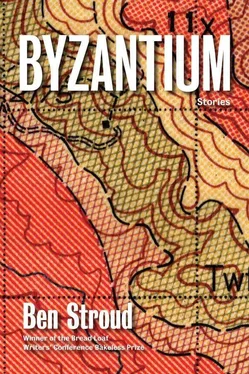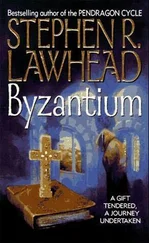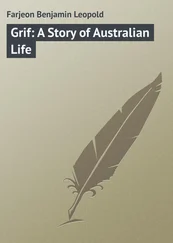I fell to my knees. It was the final blow.
XII
Leave-taking
After I met Timson’s man, I drifted in a stupor for a week, passing from the city to the wastes and back again. The clouds came in low over the gulf, the rain fell gray and cold, and by the time the sun returned, I knew I could live here no longer, where every effort proved another folly. These streets, these shores offered no succor for the loss of my Penelope, only frustrations to inspire the laughter of my neighbors.
“I am sure,” Dr. Smith said, smiling and raising his glass, “that in Manhattan you will find an environment as nourishing to your creative faculties as the biscuit has been to your corporeal ones.” This was during our last dinner together, on the eve of my departure. Dr. Smith had taken the news of Timson hard, but charged me with no fault. Already he was full of plans for turning the warehouse into a medical college, where he would meet daily with his students to pick over fresh corpses.
“I hope you are right,” I answered, accepting his toast and his present of a meal of fresh beef. Yet I was unable to enjoy either. The Honduran debacle had left me in a poor state. My soul, abandoned once more to the arid climes of despair and disappointment, had dried and cracked within me, so that it rattled in the hollows of my body like chips of bone. And lately the abolitionist press had begun to mock me. They called me mercenary for my attachment to Timson’s campaign, raising too my experiments with the Cooling Safe. But then I roused myself. Even in my depths I could glimpse the world we were making; it shone like a jewel in the sun.
The next morning, the morning I left Galveston, I dropped the remaining stock of meat biscuit in the water. The canisters broke upon the jetty rocks, and gulls fought over the crumbs afloat on the waves. I stood there, watching for nearly an hour before turning my back on what I was determined would be my last failure.
THEY HAD BECOME SOMETHING of a fascination of mine: communes cut out of the interior, new societies where all were equal and either Jesus or Liberty reigned. Some days, after reading an account of a blind prophetess leading her followers to Illinois, or of a mill town where all shared labor and wealth equally, I yearned to give up my life and join them. I felt as if we lived in a hurtling age. It seemed all humanity stood on a precipice, that in the distance, beyond the coal smoke and the tangle of telegraph wires, could be spied a shining metropolis where men would be re-formed. But I spent my days stuck in my father’s shop — at twenty-three I was his peer in making the fiddles and other cheap instruments we sold to travelers embarking from the docks — and my nights in drink with friends. I need only walk the streets of my Baltimore, pass a slave carrying bricks on his crooked back or a rheumy-eyed sailor, ruined by the sea, begging alms and ale, to feel the rottenness in my soul. Men could not be changed, and I, one among millions, would never make it to any dream city.
Even so, the yearning never left me. One night, during yet another of my regular debauches, I rose without a word and left my friends in a steaming oyster house. I had seen notices in the paper of a Hebronite meeting. Their leader and revelator, Josiah Kershaw, was touring the East to summon new followers to the city he was raising on Peaine Island, a wilderness in the far northern reaches of Lake Michigan. All week the papers had mocked Kershaw. To them he was a gross fabricator, the great paradise he promised a myth, the prophecies on which he claimed his authority pure forgeries. But I was intrigued. His talk of harmony, of plain lives lived according to rule, stirred my hopes. I had passed the last weeks in a violent melancholy, pining for a woman who didn’t know me, a ship captain’s young wife. Increasingly I had seen my future, bound by an invisible chain to the worktable just like my father. And so, unsteady on my feet after five whiskeys, I searched for the inn where the meeting was to be held. By the time I found it my heart beat heavily in my chest and sweat dripped from my skin. My nerves were electric with anticipation.
Eyes turned to look at me when I stumbled into the room. The meeting was already under way. At the front a graybeard clutched a Bible and kept his eyes shut as he recited a prayer. I sat in the back and gripped my knees to keep from swaying. The graybeard droned on. People yawned and scratched their noses. After fifteen more minutes of this — the prayer was unending! — I could barely master myself. I was an imbecile. There was nothing for me here. I glanced at the door, but before I could rouse the courage to get back up, the graybeard sat and another man stood.
“Those who walk in the way of the Lord will receive His blessings,” he shouted, and with those words and that marshal’s voice I was seized. My drunkenness lifted from me. My eyes steadied, my mind ceased to yaw, my limbs stiffened with sober life. I recognized Kershaw from the newspaper illustrations. He was tall and spare, with a trimmed auburn beard and a high forehead seemingly shaped for the guarding of truths. His eyes glittered as if catching the wonders of his heavenly Guide. He paced before us, and something in him called to me. Without knowing why, I hungered for his blessing.
Five years earlier, he told us, he had been a coal shoveler in Chautauqua County. There, one black night, angels of the Lord bearing heavenly candles had shown themselves to him and revealed a golden scroll hidden in a cave. On this scroll he found descriptions of Peaine Island. The Lord had chosen it as the site for a holy city, a place where men would live in harmony under new laws and seek pleasure in labor, purity in distance from all the corruptions of the East. Already the city was begun. Kershaw had registered it as Port Hebron, after the ancient city of refuge, but when it reached its ordained population of 144,000 it would take its true name of Zion. Then ambassadors from all the world’s nations would wait upon him and his followers, Kershaw told us, and Jesus would descend to take His golden throne. I felt the island rise inside me: the pines, the clear water, the small bay, the city shining like a diadem in the lake. The Lord was speaking.
The next morning, as I departed, my father damned me for a fool. He stood as I packed my set of Italian tools and forms and enough cured maple and ebony for a dozen violins. At last he called me cruel for abandoning him and refused to give me his hand in farewell. Ever since my mother died I had been his sole companion, though it had been a companionship passed in silence. His words pained me — I had always been a dutiful son, always done as he asked — but I had heard the call.
I TRAVELED BY RAIL TO BUFFALO and there waited a week for the steamer that took me up the lakes. I spent my days onboard watching the shore, which grew wilder once we left Lake Erie and passed Detroit. The stands of birch and pine along Huron seemed unending. Isolated wisps of smoke, from a cabin or a camp of loggers, signaled the only life.
When at last we put in at the Mackinac settlement, surely one of the remotest in our Union, the sailors shoved their way into the pine-board bars that lined the harbor beneath the fort. Such places repulsed me now, and I and my fellow Hebronites — we’d soon found each other on the ship — walked along the beach and talked of our new lives on Peaine Island. It was on this walk that I saw my first whiskey trader. He sat on a shop porch, wrapped in furs. His cheeks were dirt-stained, his eyes as smoldering coals. He watched me and the other Hebronites as we strolled past, and his look made me shiver. Soon I would learn of the hatred the traders felt for us, but as yet I was ignorant. I tried to shake the look from me as I walked to the boat. The next morning the steamer left Mackinac, passed through the Straits, and called a little past noon at Port Hebron.
Читать дальше











